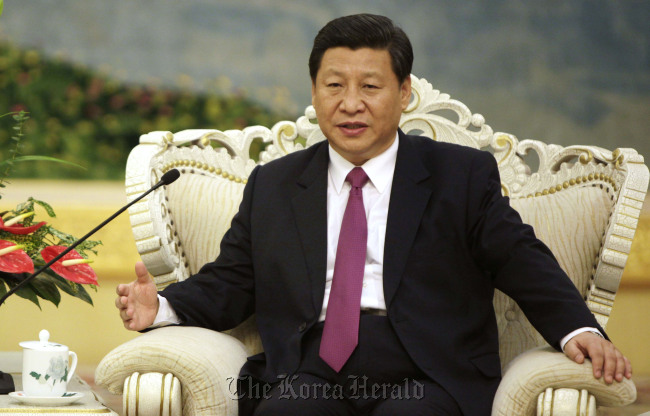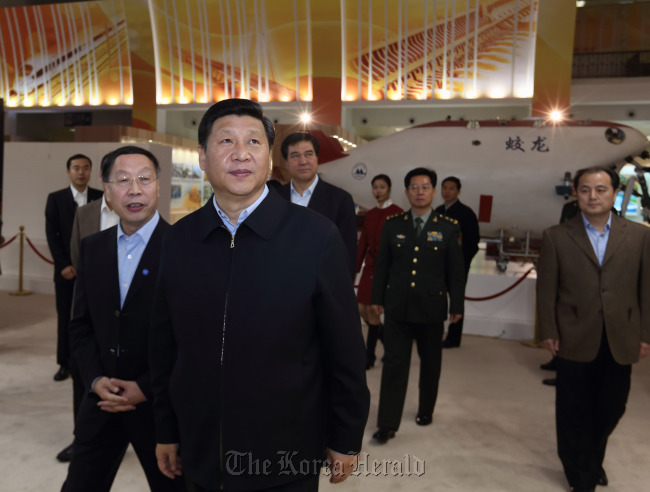Shift in N.K. policy unlikely under China’s new leadership
Xi expected to maintain nation’s clout over its impoverished ally
By Shin Hyon-heePublished : Oct. 31, 2012 - 20:28
Following is the first in a series of articles on the future relations between China and two Koreas under next Chinese leader Xi Jinping ― Ed.
One week before enthronement, China’s next leaders are expected to maintain their predecessors’ policy toward stability on the Korean Peninsula, experts said.
Ahead of the once-in-a-decade power transition in the emerging global powerhouse, the international community is closely watching for any signs of shift in its policy toward Pyongyang.
While almost nothing is known about the soon-to-be Chinese president Xi Jinping’s policy, a majority of analysts expect his government to continue to pressure Pyongyang to refrain from provocative behavior, promote closer economic cooperation and try to persuade it toward economic reforms.
In the face of domestic obstacles ― political reform, a cooling economy, loudening middle class voices and other “growing pains” ― the budding leadership is likely to follow through on the Communist Party’s intention to keep influence over its destitute ally by helping defuse tension in the region and refurbishing its antiquated economy.
“I don’t think that a change in policy should be anticipated under Xi unless there are major changes in U.S. policy or in North Korean policy. In my view, even a third nuclear test by North Korea is not likely to cause a major change in Chinese policy,” said Bonnie Glaser, freeman chair in China studies at the Center for Strategic and International Studies in Washington.
“The Chinese are currently seeking to promote economic reform in North Korea, to strengthen China’s ties with North Korea and potentially increase Chinese leverage and influence, and ensure that North Korea remains stable. These are enduring interests.”
One week before enthronement, China’s next leaders are expected to maintain their predecessors’ policy toward stability on the Korean Peninsula, experts said.
Ahead of the once-in-a-decade power transition in the emerging global powerhouse, the international community is closely watching for any signs of shift in its policy toward Pyongyang.
While almost nothing is known about the soon-to-be Chinese president Xi Jinping’s policy, a majority of analysts expect his government to continue to pressure Pyongyang to refrain from provocative behavior, promote closer economic cooperation and try to persuade it toward economic reforms.
In the face of domestic obstacles ― political reform, a cooling economy, loudening middle class voices and other “growing pains” ― the budding leadership is likely to follow through on the Communist Party’s intention to keep influence over its destitute ally by helping defuse tension in the region and refurbishing its antiquated economy.
“I don’t think that a change in policy should be anticipated under Xi unless there are major changes in U.S. policy or in North Korean policy. In my view, even a third nuclear test by North Korea is not likely to cause a major change in Chinese policy,” said Bonnie Glaser, freeman chair in China studies at the Center for Strategic and International Studies in Washington.
“The Chinese are currently seeking to promote economic reform in North Korea, to strengthen China’s ties with North Korea and potentially increase Chinese leverage and influence, and ensure that North Korea remains stable. These are enduring interests.”

Xi, 59, will be officially anointed at the party’s helm on Nov. 8 along with a new generation of leaders. He has since 2007 been serving as vice chief of the Foreign Affairs Leading Small Group, the party’s decision-making body headed by incumbent Hu Jintao.
At large, China is forecast to carry on its efforts to boost its say on the international stage and maintain stability around the peninsula.
The Xi government’s foreign policy will likely focus on a fierce rivalry with Washington, whose rebalancing strategy toward Asia has irked Beijing’s top brass. That still feeds China’s interests in the North as a deterrent against U.S. influence in the region.
“The U.S. pivot to Asia serves as a factor that makes North Korea even harder to give up on,” said Kang Jun-young, a Chinese studies professor at Hankuk University of Foreign Studies in Seoul.
“But it’s a strategic choice, for good or ill. That will hardly result in a significant change in Chinese policy but the new leadership may take a more realistic standpoint and shift to securing greater sway over the North Korean economy rather than military support.”
Pyongyang would also benefit from the status quo. Amid deepening international isolation, the cash-strapped regime has been firming up economic ties with Beijing through trade, investment and joint industrial projects.
A barrage of sanctions targeting the North’s nuclear programs has suffocated revenue streams and outside assistance. A series of recent provocations including an April rocket launch have frozen most inter-Korean projects.
At stake is the communist North’s perceived aspiration for economic reform, which China could propel by providing fuel, hard currency and other essential resources.
Since taking power in December, young leader Kim Jong-un has been challenging the military’s iron grip, exposing the reclusive family to the public and retuning the regime’s economic strategy.
“The traditional friendship between China and the DPRK was fostered by earlier generations of leaders from both countries and forged with the blood of the two peoples,” Xinhua News Agency cited Xi as telling late autocrat Kim Jong-il during first overseas trip as vice president to Pyongyang in June 2008.
“The people of the two countries have always understood, sympathized, supported and helped each other,” he said, adding that the ties are “inalterable and have withstood international flux.”

Adding volatility in the region is imminent elections in South Korea, the U.S. and Japan, all of which are members of a multilateral forum aimed at denuclearizing the North.
The 18th quinquennial congress comes only two days after the U.S. presidential election. South Korea’s Dec. 16 vote will replace conservative President Lee Myung-bak with one hoping to engage Pyongyang. Japan is predicted to elect a more nationalist prime minister when it holds general elections later this year.
Concerns are rising over the future of six-party talks as policy cooperation could become tougher if Republican challenger Mitt Romney succeeds in unseating U.S. President Barack Obama. Romney views the North as a “rogue nation” and has vowed to brand China a “currency manipulator.”
As in Asia, Beijing would want to work more closely with Seoul, a staunch U.S. ally, to resolve North Korean issues and keep up economic exchanges.
Another variable is heightened rows between Beijing and Tokyo over remote islands in the East China Sea, called Senkaku in Japan and Diaoyu in China. Japan also claims South Korea’s islets of Dokdo in the East Sea.
Combined altogether, the ever-changing political landscape in the region and the world may bring about a shift in the foundation of the decades-long partnership between Beijing and Pyongyang, from the “blood alliance” forged during the Korean War to a geopolitical concept, said Yoon Duk-min, a professor at the Korea National Diplomatic Academy in Seoul.
“China’s commitment to the ‘blood alliance’ could be withered under the fifth generation leadership (consisting of relatively young leaders),” he said.
“Nevertheless, the leaders’ interests in North Korea may be reinforced if they take a geopolitical approach, with China increasingly leaning toward power politics and an interests-based attitude toward such issues as the territorial dispute in South China Sea with the Philippines.”
Despite looming ups and downs, the region’s multilateral dynamics would return over time to the usual mixture of cooperation and competition, Glaser of the CSIS said.
“In a prolonged period of Chinese suspicions of U.S. intentions, it is quite possible that Chinese cooperation with the U.S. on issues such as North Korea could be reduced. But there are many other variables that would influence Chinese decision making,” she told The Korea Herald via email.
“Generally, if the U.S., Japan and South Korea are cooperating closely on North Korea, there is greater pressure on China to cooperate ― China doesn’t want to be isolated. … Of course, North Korea’s behavior would be an important factor as well.”
By Shin Hyon-hee (heeshin@heraldcorp.com)










![[Hello India] Hyundai Motor vows to boost 'clean mobility' in India](http://res.heraldm.com/phpwas/restmb_idxmake.php?idx=644&simg=/content/image/2024/04/25/20240425050672_0.jpg&u=)








